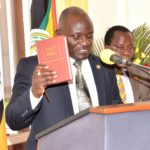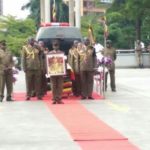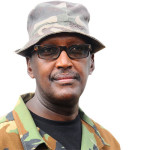The leader of Sudan’s Transitional Military Council (TMC), Lt-Gen Abdel Fattah Abdelrahman Burhan, has been sworn in as leader of the newly established sovereign council.
He will lead a group of six civilians and four other military officers as part of a planned 39-month long transition to democracy.
There will also be a prime minister and cabinet.
The new government comes after Omar al-Bashir was ousted in April.
He had been president for nearly 30 years but was removed by the military after months of protests.
On Saturday, the TMC and civilian leaders signed a deal that should pave the way to a new democratic dispensation.
Under the agreement, Gen Burhan will be in charge of the Sovereign Council, which replaces the TMC, for the first 21 months; a civilian will then take over until elections in 2022.
The other 10 members of the council were also sworn on Wednesday.
In addition, respected economist Abdalla Hamdok, who was nominated by civilian protest leaders as prime minister, is due to be sworn in.
The ministers of defence and interior, who will be part of a cabinet, will be chosen by the military.
‘We will work together’
The deal was not perfect but was an important step, Dr Mohanad Hamid, a spokesman for the umbrella opposition group, the Sudanese Professionals Association, told the BBC.
“We are positive that we are together as Sudanese, a government and people that will together push forward to improve the level of our economy, improve the level of our health system and our education,” he added.
Gen Mohamed Hamdan “Hemeti” Dagolo, the second in command in the TMC, has pledged to abide by the terms of the deal.
Who is Lt-Gen Burhan?
- Born in 1960 in the village of Gandatu, north of the capital, Khartoum
- Studied at a Sudanese military academy and later in Egypt and Jordan
- Appointed Inspector General of the army in February by President Bashir
- Named as head of TMC after removal of Mr Bashir
- Coordinated sending Sudanese troops to Yemen as part of a Saudi-led coalition

What did the two sides agree?
On 4 August the military and protesters signed a constitutional declaration which paved the way for the formation of a transitional government. A formal signing ceremony took place on 17 August.
They agreed on the following:
- Power-sharing will last for 39 months
- Elections to be held at the end of that period
- A sovereign council, cabinet and legislative body will be formed
- A general will head the council for the first 21 months, a civilian for the remaining 18
- Sovereign council will have 11 members (5 civilian and 5 military nominees plus one agreed by consensus)
- A prime minister, nominated by the pro-democracy movement, will head the cabinet
- The ministers of defence and interior will be chosen by the military
- The other positions will be taken by pro-democracy candidates
- Sovereign council and cabinet members barred from running for election
The long transition period is seen as a victory for the pro-democracy movement – the generals had threatened a snap election after the 3 June crackdown, during which more than 120 people were reportedly killed, with many of the dead dumped in the River Nile.
Demonstrators argued that Mr Bashir’s regime was so deeply entrenched that it would take time to dismantle its political network and open the way for free and fair elections.
How did the crisis unfold?
It can be traced back to December 2018, when then President Bashir’s government imposed emergency austerity measures.
Cuts to bread and fuel subsidies sparked demonstrations in the east over living standards, and the anger spread to the capital.
The protests broadened into demands for the removal of Mr Bashir, who had been in charge for 30 years.
In April, the president was overthrown by the military after sit-ins outside the defence ministry, but demonstrators then wanted to ensure authority was swiftly transferred to a civilian administration.
A council of generals led by Gen Burhan assumed power, but it has struggled to return the country to normality.
The army is not a unified force in Sudan; paramilitary organisations and various Islamist militias hold some sway.
The Rapid Support Forces (RSF) led by Hemeti – which grew out of the notorious Janjaweed militia that was accused of carrying out a genocide in the Darfur region of western Sudan – have been blamed for recent abuses.
These include the 3 June massacre.
RSF leaders have denied planning the killings, which they say were carried out by rogue elements.








